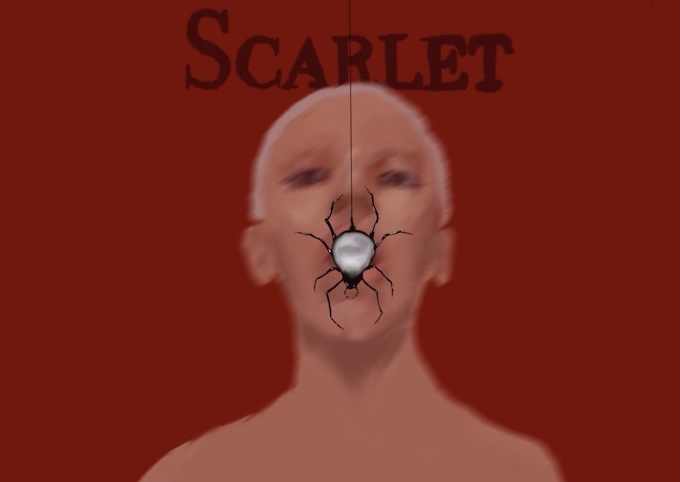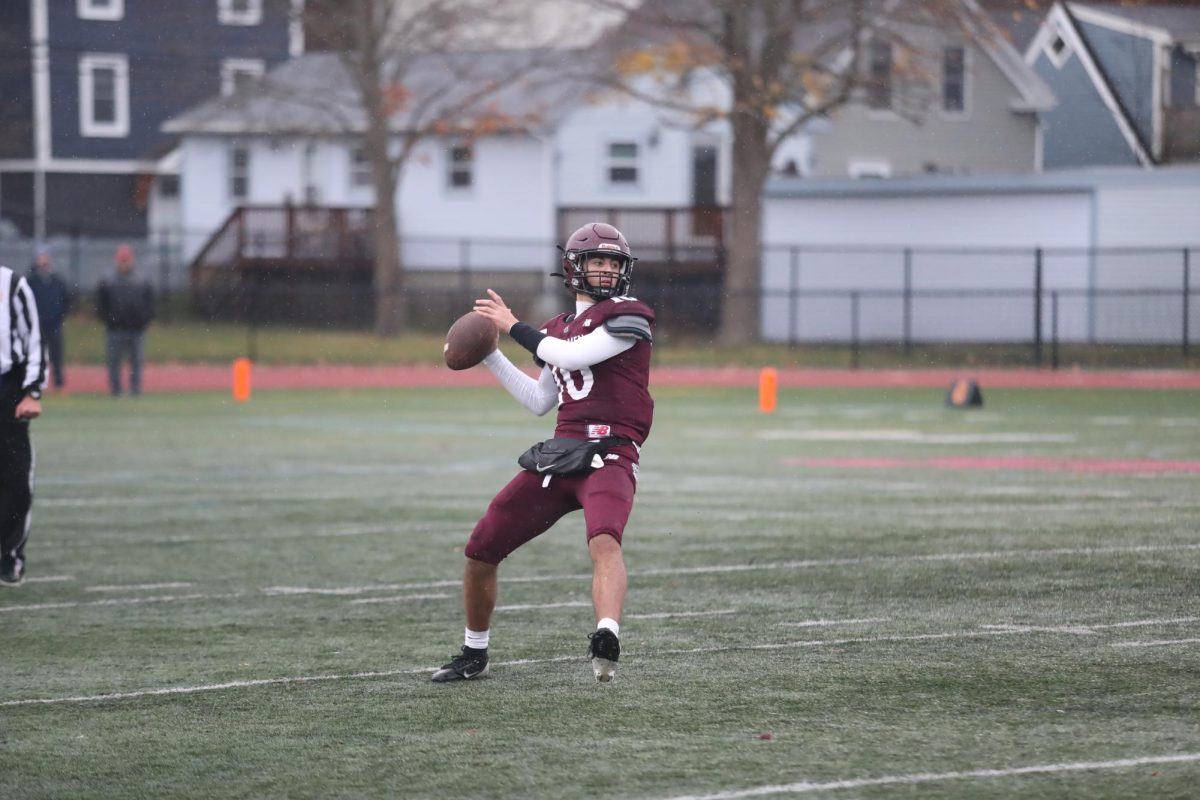Recently, Doja Cat has been one of music’s most controversial figures. From media accusations of demonic alliances, to Doja herself claiming that her previous hit albums have been “cash grabs,” Doja Cat has hardly been able to stay out of the spotlight. She’s drummed up conflict with her fan base, getting into arguments online with over-invested fans. One fan wanted her to tell her fanbase she loved them. Her response? “I don’t though, cuz I don’t even know y’all”. Her recent Instagram posts have only gotten more experimental and strange in terms of fashion and visuals, and up until now, her comment sections had been full of vicious vitriol and misogyny.
All of this has been promotion for her 4th studio album: “Scarlet”. When I started writing this article at 4:00 p.m., the day after this album dropped, less than half of the songs on the album had over a million plays. At 9:00 p.m., that number had climbed to almost all of them.
The rapper has talked a big game about how she’s taking things in an edgier direction.The album opens with a song that, if you’re on TikTok, you’ve definitely heard by now: “Paint the Town Red.” In online spaces, fans have pointed out something about “Paint the Town Red”: it’s a good song, but it sounds distinctly like Doja Cat. If this is to be believed, “Paint the Town Red” is an odd way to open the album. But while Doja Cat’s claims of a fresh sound fall flat with “Paint the Town Red”, the next four songs are certainly unlike what we’ve heard from Doja before.
These first few tracks are the rap equivalent of Billie Eilish’s “When We All Fall Asleep, Where Do We Go?” in terms of production – experimental, darker, distinctly modern, a little creepy. Doja Cat experiments a little on these tracks, particularly in one of the album’s singles, “Demons”. While weak in places, this experimentation is a worthwhile effort. Doja focuses on calling out the behavior of her fans and haters in her verses, and although not quite up to the standard of her greatest hits, it’s fun to see Doja try something new. The first stand-out track for me on “Scarlet” is “F*** the Girls”, track 4. Doja scorns the hot-fingered critics that are quick to insult when she shaves her head and gets tattoos, and even quicker to switch up when she dons a wig and a skimpy outfit. Can you blame her for a refrain like: “F*** the girls / They ain’t with me, then they with me, so / F*** the girls / I don’t need ’em, I’m too pretty, so”?
I have similar feelings about the middle tracks on this album – “Gun”, “Go Off, and “Shutcho” in particular have all only gotten better with each replay. These tracks are enjoyable listens, but harder to enjoy with Doja’s scorn ringing in your ears – it’s easy to compare them to the sound of her previous albums, and even easier to remember the disdainful way she regards those albums now.
Track 10, “Agora Hills” is a standout song about wanting to express love in public: “I wanna show you off / I wanna brag about it / I wanna tie the knot”. The title references the LA suburb she was raised in, and also agoraphilia, a name for a fetish for public intimacy. Though it’s early, it seems the public has named “Agora Hills” as a fan favorite already, a prediction I had when I first listened to this song. Her voice evokes Halsey in a strange way in verse one: she puts on a sort of Valley-girl-esque affect that would be unnerving if it wasn’t so catchy.
Doja’s decision to not include any features on “Scarlet” is problematic for this particular section of the album – while good, these songs start to blend together and suffer from a lack of memorability. Tracks like “Can’t Wait” and “Often” seem oddly flowery in terms of lyrics for a Doja Cat song. Given that this album’s marketing has erred on the bloody side, it’s funny to hear lyrics like “I wanna write you poetry and jokes and even songs” in the middle of it.
Track 15, “Attention”, is the lead single off “Scarlet”, starting with an ethereal strings intro and leading into impeccably relevant rap verses and elegant instrumentals. “Attention” is easily my favorite song on this album, and the strongest; it’s punchy, catchy, and it’s a frank address of the media storm around Doja Cat: “Lookin’ good but now they all sayin’ that I’m ugly / Boo hoo, my n*****, I ain’t sad you won’t f*** me / I’m sad that you really thought your ass was above me / You’re lucky cuz I just paid your bill with a reply”.
“Balut”, the penultimate track on “Scarlet”, is yet another address to over-invested, chronically online fans, and another single on “Scarlet”. The song’s concept is interesting, but she phrases her explanation oddly: “I named the song ‘Balut’ because it signifies a bird that’s being eaten alive,” Doja Cat said in a post on her Instagram story. “It’s a metaphor for Twitter stans and the death of Twitter toxicity.’”. Balut is a dish from the Philippines, and some have criticized her for implying that the Filipino people eat birds alive, as the dish balut is cooked bird embryo and not a live bird.
Throughout this album, one hears how comfortable Doja Cat has gotten with her musicianship. Her flow is as unmistakable as one could hope from a rapper of her caliber. Doja addresses a lot in “Scarlet”: her controversies, her joys, her feelings, her frustrations. It’s hard to top her previous album, “Planet Her”, and I can’t say in good confidence that she’s accomplished that. She’s put out a good, solid record, but the question lingers: is it enough? Is Doja Cat still canceled?
I’ll be honest, I’d been pulling back from Doja Cat’s music recently. I love “Hot Pink” and “Planet Her”, and Doja’s claim that these albums were “cash grabs” stung a little. A lot of people online felt similarly. That feeling is perfectly understandable. At the same time, it’s exactly the kind of parasocial feeling Doja Cat has been speaking out against. As a fan, we want to like the things our artists like. What happens when they dislike their own art?
The concept of artistic reinvention is nothing new. Musicians do it all the time – after being canceled, out of boredom, after a flop album – and that’s a good thing. When an artist reinvents themself after controversy, there’s a key component to a successful reinvention: the quality of the music has to outshine the drama.
The question is, was she successful? Did “Scarlet” turn public opinion back in her favor? If you look at her Instagram comment section post-release, the answer to that is a solid yes.
“Scarlet” is not what I expected it to be. I, like many other fans, anticipated something more like a hardcore gangsta-rap-esque record, or an alt-rock album, something new and challenging to match her new aesthetics and controversies. “Scarlet” is not that. “Scarlet” is Doja Cat creating the music she is good at creating, in the styles she is most comfortable in. It’s less boundary-pushing than anticipated, but maybe that isn’t a bad thing. The album has a number of great songs – and isn’t that enough?
The politics of this album are equally, if not more, interesting than the music itself. Doja Cat occupies a unique position in pop culture right now: she is a woman and an artist who refuses to conform to industry standards of what a female star should be. She isn’t personable and sweet like Olivia Rodrigo, she isn’t a mother goose to her fandom like Taylor Swift, she isn’t clean and curated and polished like Megan Thee Stallion. Doja Cat is challenging this idea that our stars need to be perfect, morally and musically, to deserve their success.
Women, and women of color in particular, are subject to strict, moral parameters when put in the spotlight. They have to be nice. They have to be loving. They have to figure out what is most pleasing to their audience, and execute it perfectly. Doja Cat has decided to live in the way that works for her, at the expense of all these things.
It’s time to see Doja’s controversial statements, fashions, and online posts for what they are: a marketing tool to sell her album. Doja Cat is not perfect. She is human, and fallible. Her Instagram posts have acted as a sort of social experiment: she posts blurry, unsettling selfies and bizarre memes, and the comments are full of chastising, shaming, and condemning. She posts pictures of herself ultra-femme, dolled up, breasts exposed and face made-up, and suddenly she has the public’s approval.
Her decision to shave her head was perhaps the most controversial decision she has made. The rapper has expressed multiple times that she never liked having long hair, and that shaving it off has made her feel more comfortable. In doing this, she defies what an ideal black woman in music should be: feminine, sexy, voluptuous, appealing. It is controversial for a woman to do something with her appearance that makes her “less attractive” in favor of her own security. It is controversial that a woman should exist for herself, and not for the consumer. It is time we see the public’s dislike for her new style for what it is: misogyny.
Doja Cat’s controversial statements regarding her fans seem intentionally inflammatory. She has decried large swaths of her listeners as fake, catty, obnoxious, etc. The thing is, she’s right.
During Doja’s Instagram experimentation, she received hatred and scorn like never seen before. She was attacked by hyper-religious fanatics, ripped apart by self-proclaimed “ex-fans” who disapproved of her not holding herself to the high moral bar we have set for celebrities. We implicitly expect celebrities to tolerate bad behavior from fans as a part of their job. In the current culture, fans have become watchdogs for celebrity bad behavior. But celebrities are people as much as the public is. The internet makes it easy to put people on pedestals. Maybe it’s time to stop idolizing people who aren’t meant to be idolized, appreciate art for what it is, and stop allowing our idols to have such absolute control over our feelings.
Doja Cat has been calling out the highly parasocial and unhealthy way many people relate to her and her music. She has made it clear that she appreciates the fans that are there to enjoy her music and let her live. Is there anything truly wrong with that?
We do not know Doja Cat. She is a musician. She is a person. Her job is not to make you feel like she’s your best friend. Her job is not to behave in a way that makes you feel comfortable. Her job is not to be perfect.
Her job is to make music.













